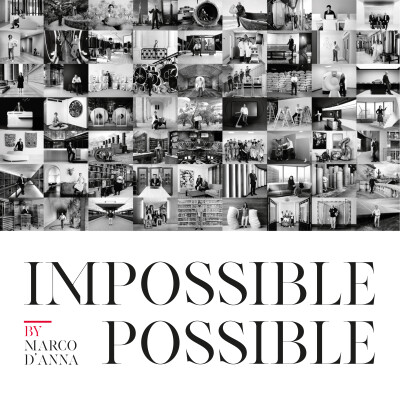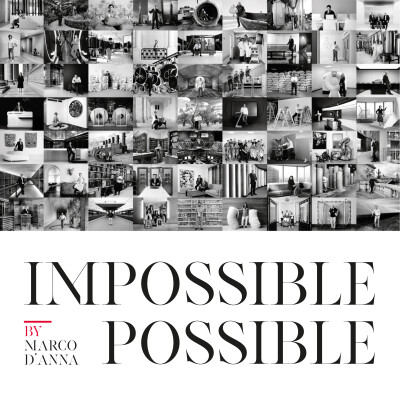Makhtar DiopIt is a constellation of events that make me who I am. There are specific moments in my life, there have been choices to be made, decisions to be made, with a dose of spontaneity, a dose of reflection, that have led me to be who I am. So there is not one event, there is a sequence of events that have led me to a critical path that defines who I am. I am really lucky to have the life I have had. A life where I had a family that was, in a sense, very rooted in our tradition, but also with an extraordinary openness. And I lived in an environment where it was important to understand our tradition and to be very proud of who we are, and I think that mix has helped me a lot to be who I am. There was something my father used to say: "Respect everyone. Treat the person below you in the hierarchy the same way as the person in a position of power". And so this relationship with power, we were taught very early on that it was not the most important thing, we had to do the right thing. So we lived in that atmosphere. When I started negotiating with the International Monetary Fund and the World Bank on the Senegalese side, I was 26 years old, so that is relatively young. I decided to study economics and deepen my knowledge of economics because I had mostly studied finance and economics, but I wanted to specialize in economics and I wanted to do it in an English-speaking country. So I studied at the University of Warwick and the University of Nottingham, and then I went to the International Monetary Fund, where I also worked as an economist. When there was a change of government in the year 2000, I was 39 old, I was relatively young as well. I was called upon to serve as the Minister of the Economy and Finance of Senegal. It was really one of the first coalition governments. It was an extraordinary adventure because I was with all the party leaders of a coalition. We had to move from the time when we were writing notes advising a minister to a position where we were the ones who had to make decisions and face the consequences of those decisions immediately. And I think that until you take that step, sometimes you do not realise the complexity of taking those decisions, getting them accepted in the Council of Ministers, convincing the Head of State when necessary, and being able to take responsibility for protecting the government. And that whole journey has enriched me and allowed me, I think, to see things from different angles when I was in positions at the World Bank as a director, then as a vice-president, and now as a general director of the International Finance Corporation. And I think that in each of my roles, I have built on the previous experience or the experiences that I have had to try to come up with solutions. In some cases, certain decisions require us to think and approach the unknown with a certain perspective. And sometimes, as they say in English, there is a leap of faith that we must take. We have to say to ourselves: "Listen, right now, I am not sure. Maybe the glass is half full, or maybe half empty. Should I do it, should I not do it?" And in those moments when we have to make a decision quickly, without really having much time to think, trust is an important element. And if we do not have it, we cannot make certain decisions, which are timely decisions, but timely decisions that must be made in a very short time. That is what is particularly important. At some point, we have to make the decision now. We cannot defer it. It is not in ten years, it is not in twenty years, it is not in a month, it is now, at this moment. It is the reality that is calling us. At that moment, we look the person in the eyes and then we say to ourselves: "Listen, can I make this bet with this person or not? So to me that is trust. Now, having said that, that trust is built up over a long period of time and that trust can be lost very quickly. So it is something very asymmetrical. It takes time to gain that trust and we lose it very easily. And it is not only in relation to these interlocutors, it is also in relation to these teams. Sometimes, and I give an example that may seem very trivial and very simple. For those of us who have children and have taught them to swim, first you say the boy has a float, or the girl has a float, we take away the float, we say: "Now you have learnt the breaststroke, you can do two or three strokes." They go under, once or twice, they are unhappy, we say: "No, you can do it my son or my daughter, come on, five more meters, three more meters, four more..." and one day, you say: "my son or my daughter or my nephew, we are going to throw you into the pool and you are going to swim the whole length." During this time, this person has a lot of questions. Sometimes, they do not like you at all. "I am going under, I hate it, why did you force me to do this?" But when the person gets to the end of the pool and says "I did something I have never been able to do" and gives you that big smile, it is something unique. And for that person to take this journey with you, you have to have built that trust. When it comes to children or families or young people close to you, that trust exists, it has been built since birth. When it comes to people with whom you have walked for a shorter period of time, that trust has to be there. And life, development, that's it. We dive into the pool, sometimes we think we can't make it to the end of the pool, but we can and we do, and when we do, we accomplish something special together. The counterpart of trust is responsibility. When I was 39 years old and was chosen to manage the economy and finances of my own country, for the first time there was a change in administration, it was a huge responsibility. We have an obligation and a duty not to disappoint the people we serve. In the same way in my current role, there are many responsibilities. You cannot disappoint, but not disappointing should not make you conservative, it should not annihilate your ability to create and take risks. And I believe that sport contributed to that for me. My father forced us all to do sport, and my athletics coach, who trained me a lot, had been to the Olympics three times; he was a finalist. He would tell us this: Lose with dignity and win with humility. And that's why I got into the habit of celebrating, even in sport. He said it was a way of showing respect to your opponent. And he really instilled that in us. The other thing is that if you are trained properly, there is never any confusion for the referee to interpret a decision one way or the other. So those are two values where we challenge ourselves, where we do not look for excuses for our failures, because in life we have many failures. And learning from that is important. And the second is to respect people. Because just as I have had a career that I am proud of, there are many other people who have had intellectual abilities, perhaps much higher than mine, who have not had the opportunity or the luck or the circumstances that have led them to where I am. And so I think we must humbly acknowledge that we are not unique. One of the questions, to be honest, that often bothers me is when I am told: 'Oh, you are the first African to be in such and such a position, so you are special.' No, I am not special at all. There are hundreds of Africans who could be where I am. And it's simply the circumstances... And when I am asked this question, I often ask them: 'Would you ask the same question if it was a European or an Asian?' So, I do not feel special or exceptional at all. It's just the circumstances of life that have led me to where I am.




